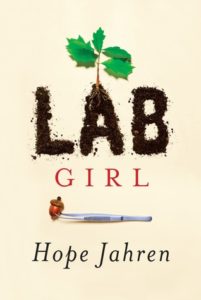 This month, let’s try an intensely introspective autobiography of a botanical scientist, wrapped in a biography of trees, flowers, and plants.
This month, let’s try an intensely introspective autobiography of a botanical scientist, wrapped in a biography of trees, flowers, and plants.
Hope Jahren, a professor at the University of Hawaii at Manoa in Honolulu, writes the clear, coherent, and engaging story of her upbringing in Minnesota, her education, travel and work in California, Georgia, Maryland, and Hawaii, intermixed with her study and analysis of the history and lives of plants and trees. And she apparently has a photographic memory as she recalls detailed conversations with her teachers, students, science mates and husband.
But, early on in my reading, I had a nagging question: does this intense self-analysis and self-reflection indicate something else?
Jahren finally acknowledges being a “manic-depressive woman” four-fifths of the way through her writing. She is consumed with her love of and study of plants: it dominates her life.
Fellow human beings? She acknowledges an early debt to her science-minded father, but never mentions him again after her first pages. Her scientific partner, Bill, is never granted a last name, nor is her husband, Clint. And none of those three is mentioned in her credits. She devotes one of the longest chapters to the birth of her son, but he remains nameless (mentioned only as “my toddler” and “my son.” Note he is not “our” son.)
But her often lyrical phrases continue to delight you as a reader, “a leaf is a platter of pigment strung with vascular lace,” and “vines are hopelessly ambitious,” and “being able to derive happiness from discovery is a recipe for a beautiful life.” Hers is a two-part, parallel story of intense curiosity – her science and her life.
Her self-analysis close to the end reads as follows:
“I’m good at science because I’m not good at listening. I have been told that I’m intelligent, and I have been told that I am simple-minded. I have been told that I am trying to do to much, and I have been told that what I have done amounts to very little. I have been told that I can’t do what I want to do because I am a woman, and I have been told that I have only been allowed to do what I have done because I am a woman. I have been told that I can have eternal life, and I have been told that I will burn myself out into an early death. I have been admonished for being too feminine and I have been distrusted for being too masculine. I have been warned that I am far too sensitive and I have been accused of being heartlessly callous.
But I was told all these things by people who can’t understand the present or see the future any better than I can. Such recurrent pronouncements have forced me to accept that because I am a female scientist, nobody knows what the hell I am, and it has given me the delicious freedom to make it up as I go along. I don’t take advice from my colleagues, and I try not to give it. When I am pressed, I resort to these two sentences: You shouldn’t take this job too seriously. Except for when you should.”
If that doesn’t arouse your curiosity to read this book, I don’t know what will!
Jahren’s conclusion, “Our world is falling apart quietly.” And her more optimistic recommendation: go plant a tree once a year! Which is exactly what my wife and I have done in our 24 years in Lyme, Conn. We’ve planted 13 Evergreens, four Red Maples, three Acacia, two Apples, one Japanese Maple, and one Witch Hazel. Yes, we’ve cut down an apple savaged by a hurricane, plus two small apples, but the latter were promptly replaced with two pears!
Do read Hope Jahren … and plant a tree.
Editor’s Note: ‘Lab Girl’ by Hope Jahren is published by Alfred A. Knopf, New York 2016

About the Author: Felix Kloman is a sailor, rower, husband, father, grandfather, retired management consultant and, above all, a curious reader and writer. He’s explored how we as human beings and organizations respond to ever-present uncertainty in two books, ‘Mumpsimus Revisited’ (2005) and ‘The Fantods of Risk’ (2008). A 20-year resident of Lyme, he now writes book reviews, mostly of non-fiction that explores our minds, our behavior, our politics and our history. But he does throw in a novel here and there. For more than 50 years, he’s put together the 17 syllables that comprise haiku, the traditional Japanese poetry, and now serves as the self-appointed “poet laureate” of Ashlawn Farms Coffee, where he may be seen on Friday mornings. His wife, Ann, is also a writer, but of mystery novels, all of which begin in a bubbling village in midcoast Maine, strangely reminiscent of the town she and her husband visit every summer.